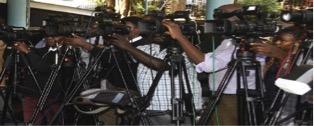Kenya’s image tainted as safe haven for journalists
Submitted by fkakooza on

As one of the African countries with the highest foreign and local media presence and the most active and independent media council, Kenya has received great acclaim for a vibrant media environment compared to other nations on the continent.
The World Press Freedom Index prepared by Reporters Without Borders (RSF) ranked Kenya at 102 out of 180 countries in 2021, and in 2022, the position improved significantly, moving to 69 out of 180, the best ranked in East Africa.
All Kenyan and foreign journalists seeking to practice in the country are required to apply for accreditation in accordance with the Media Council Act 2013 (sections 4, 6(h), 23(c) and 46). The Media Council of Kenya (MCK) conducts annual accreditation of journalists to maintain a register of media practitioners, enterprises and training institutions in Kenya.
Caroline Ajeri, a Kenyan journalist, says every journalist, regardless of nationality, is allowed to practice in the country, provided they adhere to the MCK's code of conduct.
“To practice journalism in Kenya, you must be a registered journalist, introduce yourself and the media organisation you’re working for, and follow the media laws and ethics,” she said.
Some Kenyan journalists aspire to work for foreign media agencies because of the perceived privileges such organistions offer over local media houses.
“Besides better pay, when one works for some of these media houses, one also gets to widen their scope and learn much more about different people and their cultures," says Dudley Muchiri, a journalist working with Business Daily in Nairobi.
But Kenya being a melting pot of culture and diversity, some local journalists find it fulfilling that they are able to interact easily with people from different areas and traditional backgrounds.
"In terms of engaging with the communities and obtaining sources, it is easier for local journalists. Accessing certain areas in informal settlements also becomes a lot easier," said a journalist at NTV Kenya who requested not to be named.
However, when it comes to the media environment in Kenya, all journalists, whether local or foreign, face the same threats that jeopardize their freedom and work. Press freedom is enshrined in the Kenyan constitution under Chapter Four: The Bill of Rights, Article 34, which provides for the independence of the media. However, journalists complain that this is not the reality on the ground. In 2019, RSF noted that Kenya had recorded “a slow erosion” of media freedom.
Business Daily’s Muchiri says media in Kenya face threats from the state, and government officials openly attack individual media houses and journalists during public addresses. In some instances, the police have participated in harassment of journalists. For example, hooligans and police officers attacked journalists covering post election protests on March 30, 2023 in different parts of the country, leaving six journalists injured.
The Media Council of Kenya (MCK) stated on its Twitter handle on March 30 that in what it called “the darkest month for Kenyan media since the clamour for multiparty democracy,” it had documented 25 cases of attacks on local and foreign journalists at the hands of state and non-state actors during the demonstrations.
In a statement on Twitter, the MCK chief executive officer, David Omwoyo, criticized the perpetrators, calling their actions “unwarranted, gross violation of human rights and impediment to democracy,” because journalists “have a duty to inform the public on such matters of public interest”.
Muchiri weighs in, saying, "Our current government simply hates the media and they regard us as cartels. This not only puts the individuals or journalists at risk of harassment, like witnessed during recent demonstrations led by the opposition, but also infringes on the freedom of media, which is enshrined in the constitution."
A journalist at NTV Kenya who requested not to be named said social media pose a major threat for them, forcing them to be cautious about whom they interact with online.
"We are trolled and attacked online by people who are not happy about our work. I now avoid [responding to] any negative comment online about my work," the journalist said.
- 301 reads
